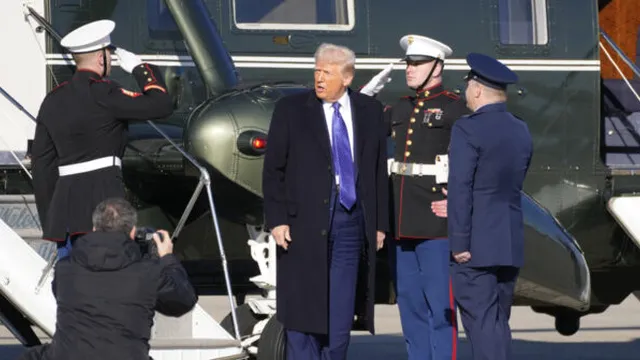
White House blocks AP reporters over Gulf of America name conflict
2025-02-15 21:28- The White House blocked an Associated Press reporter from attending an event due to the agency's editorial decision on the Gulf name.
- A second AP reporter was also barred from a later event, raising concerns about press freedom and government accountability.
- This incident illustrates escalating tensions between the Trump administration and media organizations regarding language use and editorial independence.
Express your sentiment!
Insights
On February 11, 2025, the White House prevented an Associated Press reporter from attending an Oval Office event, which was related to President Donald Trump's executive order renaming the Gulf of Mexico to the Gulf of America. This decision came after the Associated Press, which serves millions of people worldwide through impartial journalism, maintained its editorial choice to refer to the body of water by its traditional name. The incident sparked controversy about press freedom and government accountability, as several journalists voiced concern over the administration's retaliatory intentions against news organizations that do not conform to its language demands. Following the first incident, another Associated Press reporter was barred from entering a later event in the President's Diplomatic Reception Room. The White House Press Secretary, Karoline Leavitt, justified the actions by suggesting that the media's refusal to use the new name was a form of dishonesty. In the face of these events, concerns about press freedoms were raised by various organizations and media advocates, who perceived this as a detrimental step towards independent journalism. The Associated Press issued a statement highlighting the alarming nature of such measures and deemed them an affront to the First Amendment, emphasizing the need for a free and independent press. In response to the administration's increasing control over the language used by the media, other news outlets weighed in, with many deciding to continue using the Gulf of Mexico for clarity and global recognition. The situation also echoes broader patterns of President Trump's often adversarial relationship with media organizations, characterized by actions that critics consider as efforts to limit free speech and manipulate media narratives. The White House faced backlash for its stance, leading to discussions about the importance of adhering to both editorial integrity and the norms of journalistic independence amidst governmental pressures. The incident surrounding the Gulf naming dispute serves as a significant reminder of the ongoing challenges faced by journalists in maintaining their autonomy in the face of political pressures. In doing so, it highlights essential conversations about the role of government in regulating press standards and the implications such actions have on the public's right to information and the press's duty to hold power accountable.
Contexts
The First Amendment of the United States Constitution plays a crucial role in safeguarding the freedom of the press and ensuring that the public has access to information about government activities. This amendment prohibits Congress from making laws that abridge the freedom of speech or of the press, which has led to various landmark legal cases that have tested and defined these rights. Press access cases often arise in contexts where government actions might impede journalists from obtaining information, reporting on events, or freely disseminating news. These cases underscore the importance of establishing a balance between government interests, such as national security, and the public's right to know. One prominent case is New York Times Co. v. United States (1971), commonly known as the Pentagon Papers case, which involved the publication of classified documents regarding the Vietnam War. The Supreme Court ruled in favor of the New York Times, emphasizing that the government's attempt to prevent the publication was an unconstitutional prior restraint on the press. This ruling reinforced the principle that a free press serves as a watchdog against governmental overreach and is essential for a functioning democracy. It established a precedent that the government must meet a heavy burden of proof in order to justify any censorship of the press. Moreover, another significant case, Branzburg v. Hayes (1972), addressed the right of reporters to protect the identity of their sources. The Supreme Court held that reporters could be compelled to testify before a grand jury regarding confidential information. This decision raised pressing questions about the extent of press freedoms and the need for shield laws, which would offer greater protections for journalists. While these cases affirm the critical role of the press, they also highlight the ongoing debates surrounding press access, the responsibilities of journalists, and the limitations of First Amendment protections in practice. As society continues to evolve with advancements in technology and shifting political climates, the importance of press access and First Amendment rights remains vital. Current issues such as digital privacy, governmental transparency, and media consolidation pose new challenges for journalists and the public alike. The ongoing dialogue surrounding these cases and their implications for press access underscores the necessity of vigilance in defending First Amendment rights to ensure that the press can fulfill its fundamental role in democracy—informing the public, holding the government accountable, and facilitating open discourse.